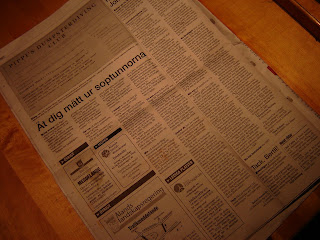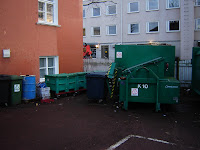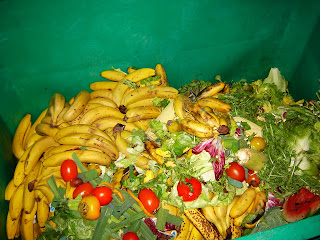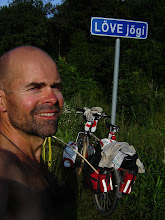"Between 8,000 to 10,000 people lost their lives within days. Thousands more died in the following years. Over 150,000 are still suffering chronic and debilitating illnesses".
They still haven't payed the people of Bhopal, and they still operate under the new ownership of DOW.
So support organic farming, this how we change the world! One person at a time!!!
And don't waste your food or any other resource.
Reduce----Reuse-----Recycle
Read the article taken from democracy.org
25 Years After Bhopal Disaster, Survivors Still Seeking Justice
http://www.democracynow.org/2009/12/3/25_years_after_bhopal_disaster_survivors
Satinath Sarangi, founding trustee of a free clinic for the treatment of all those affected by the gas leak. He is also the founder of the Bhopal Group for Information and Action and has been involved with relief, research and advocacy around the ongoing health impacts on the residents of Bhopal.
Rush Transcript
This transcript is available free of charge. However, donations help us provide closed captioning for the deaf and hard of hearing on our TV broadcast. Thank you for your generous contribution.Donate - $25, $50, $100, More...
JUAN GONZALEZ: Today marks the twenty-fifth anniversary of one of the worst industrial disasters of the twentieth century. Shortly after midnight on December 3rd, 1984, in the city of Bhopal, India, tons of lethal gases leaked from a pesticide factory run by the US company Union Carbide. Clouds of suffocating gases blanketed the city. Residents awoke with throats burning and tears streaming. The gases produced so much fluid in people’s lungs that many drowned in their own body fluids.
Between 8,000 to 10,000 people lost their lives within days. Thousands more died in the following years. Over 150,000 are still suffering chronic and debilitating illnesses. A new report released this week by the Bhopal Medical Appeal and a local clinic has found that there are still high levels of toxic chemicals in the drinking water supply in fifteen communities near the old plant. Last week Indian authorities decided against reopening the plant. They had announced they would open the factory to prove it no longer poses a threat to public safety, but reversed the decision in the face of protests.
AMY GOODMAN: In August, an Indian court reissued an arrest warrant for the former CEO of Union Carbide, Warren Anderson. The court urged the Indian government to seek his extradition from the United States. In 2001 Union Carbide was bought out by US multinational Dow Chemical. The company has refused to clean up the spreading water contamination from the abandoned plant.
Today, to mark this twenty-fifth anniversary of the Bhopal disaster, supporters around the world will be participating in an international day of action, including mass rallies, die-ins, candlelit vigils, protests and more.
I recently spoke with Bhopal chemical disaster activist Satinath Sarangi, known as Sathyu. He is an engineer who arrived in Bhopal the day following the disaster and never left, founding a clinic to provide free care to survivors and becoming a key figure in the survivors’ struggle for justice. He was recently in the United States for a twenty-two-city tour for this twenty-fifth anniversary of the Bhopal disaster. His tour was called “No More Bhopals.” I began by asking him to talk about the Bhopal disaster.
SATINATH SARANGI: Twenty-five years has passed, and yet justice has not been done in Bhopal. And yet, even today, there are people who are suffering and dying in Bhopal because of gas leak that happened more than twenty-four years before.
AMY GOODMAN: Sathyu, can you describe what happened twenty-five years ago on those nights, December 3rd, December 4th?
SATINATH SARANGI: Yeah. On the night of 2nd by 3rd December, 1984, over twenty-seven tons of toxic gas leaked from this pesticide factory that was situated right next to where more than 200,000 people, poor people, lived. And this was a factory owned, designed and operated by Union Carbide Corporation USA. And during routine operations, water entered the tank, and because the safety systems were cut down or were very badly designed, and because the entire plant was under-designed, the water reacted with methyl isocyanate, which was stored in very high quantities, and there was a reaction, which then became a runaway reaction so that there was no control. And as it is, safety systems were under-designed, they were also malfunctioning or under repair. And this gas leaked, and like a thirty-feet-high cloud, it covered about the entire city of all Bhopal, more than half a million people.
And there was no warning system in the factory. There was no one—no one from the factory was telling people to run in the opposite direction of the wind and not in the direction of the wind, as they did, and no one to tell them that they could actually protect themselves from the deadly impact of the gas by just holding a wet cloth over their nose and mouth. So the people got to know, only after they were surrounded by this cloud from all around, and they started running. And when they ran, as they ran, they inhaled more and more of this poisonous gas that sheared their lungs. And there was so much secretion of body fluids in their lungs that actually many people died, because they drowned in their own body fluids. And then there were lots and lots of people who died because of the effect on the brain. Women were aborting as they ran.
And it was the next—by the next morning, there were thousands of people dead. Within the first three days, between eight and ten thousand people died. And then in the subsequent years, more people died because of the damage that was caused to almost every organ in the body, because the poisons that people inhaled, they went into the bloodstream through their lungs and stayed there and damaged their lungs, their brain, liver, kidneys. And even more than 100,000 people still have chronic illnesses from that exposure. The next generation, we know, is marked by Carbide’s poisons. In addition, there were 30,000 people who had been drinking contaminated groundwater from the factory. Because of the reckless dumping of hazardous waste, they are sick, as well, and there is a high rise of birth defects in this population.
AMY GOODMAN: Why did you, who were not originally from Bhopal, didn’t live in Bhopal, why did you go there?
SATINATH SARANGI: I heard on the radio about it, and I thought that I must do something, and I thought I would just go to Bhopal and maybe—and do a week’s—one week’s relief work and then get back to my studies.
AMY GOODMAN: And what happened?
SATINATH SARANGI: And once I went there, I saw this just too many people suffering too badly, and I also saw that many people had come to help, and so I joined them. And then, none of us were thinking about how long we had been there, because it was—help was so much needed. People were working day and night just trying to ease the pain that thousands and thousands and thousands of people were going through.
AMY GOODMAN: Talk about Union Carbide, what it did at the time of the spill, how you believe it happened, and then how the Indian government dealt with them, and where they stand today.
SATINATH SARANGI: Yeah. What is very clear from the internal documents of Union Carbide that we obtained through the discovery process in the US federal court is that, to start with, back in ’73, when the proposal for the methyl isocyanate plant in Bhopal was approved by the Union Carbide Corporation’s Danbury, Connecticut headquarters, they knew very well that, to cut costs, they had sent “untested technology,” quote-unquote. And this untested technology involved substandard construction material. It involved substantial design changes compared to its sister plant in Institute, West Virginia. And it was built in a way that its operating costs would be much lower. And it was also built in a way that they would just dump toxic waste on the surface, which would—and there was—they already—the Union Carbide’s management already knew that a serious problem of contamination would occur. And yet, this was sent to Bhopal.
In 1980, it was made further unsafe by—because of the global cost cutting that Union Carbide headquarters from Danbury, Connecticut directed, which meant that workers were cut down. It was cut down to about half, so that while safety training used to be six months, it was cut down to fifteen days. And as a result of this cost cutting, very soon the results were apparent, which was workers were hospitalized, they were injured. One worker died. And all this information was sent from the Bhopal office to Union Carbide’s headquarters, but they took no note. What happened was they sent—Union Carbide Corporation sent a safety audit team of engineers from Charleston, West Virginia in 1982, and this team found that there were at least thirty spots where major hazard could occur in the Bhopal pesticide plant. And eleven of them were in the methyl isocyanate 7 unit, which is where the disaster occurred. But none of these—nothing was done about these hazard spots to remedy this. The information was not even shared with the local management or the workers. And so, this was a disaster waiting to occur. And Union Carbide knew that, and yet they went ahead with the cost cutting, which included shutting down a refrigeration system that was meant to be kept—that was mandated to be kept there to keep the methyl isocyanate at sub-zero temperature. Instead, the refrigeration unit was cut down just to save something like $30 a day. And so, all these deliberate design differences, the cutting down of safety systems, all this led to the disaster, which was very, very clear.
And right after the disaster, Union Carbide took this position that it was caused by a disgruntled worker, deliberately it was caused by a disgruntled worker who didn’t like the way the management was treating them, which is a very, very serious lie, because Union Carbide has not given the name of this person who—this worker who they say was disgruntled and who they say caused a sabotage, without any evidence.
The other thing that Union Carbide has done is tried to bring down the damage, downplay the damage that was caused, by flying in well-known professionals like Hans Weill, who had fudged x-ray pictures to protect Johns Manville in the asbestosis case. So Hans Weill was flown in, Dr. Hans Weill was flown in, and he said, “No, there’s no problem.”
And the third thing that Union Carbide has done is to flex its muscles and basically try to scare people against that. Like the time when the case was sent back to India, Union Carbide said that they would cross-examine every single person who claims damages from the disaster, which meant they would have—that each of the over half a million people would have to come to court, which would take more than 1,500 years.
And since ’92, when Union Carbide was declared an absconder from justice, a fugitive from justice, what it has done is that it continues to refuse to obey the summons from the Indian court, and it’s just not going there. And yet it continues—we know that it continues to do business through its current owner, Dow Chemical. And Dow Chemical took over Union Carbide in 2001, but they bought the assets. And Dow Chemical’s position is that, oh, we are not liable for Bhopal, we cannot be made responsible for a factory we never ran in a place we never went, which is totally, totally unjust. It’s wrong.
AMY GOODMAN: Sathyu, you have in 1987 the Bhopal district court charging Union Carbide and its officials and the CEO Warren Anderson with culpable homicide, grievous assault and other serious offenses. In 1989, Union Carbide and the Indian government arrived at a negotiated settlement of what, almost $500 million for all gas disaster-related injuries. Where is that money?
SATINATH SARANGI: That—Union Carbide paid $470 million for more than half a million people victimized. That money has all been distributed. Every single penny from that money has gone to the victims. It has been done by the Indian government. But it has been paltry. It was $500 per person for lifelong injuries and $2,000 for deaths that occurred in the families.
AMY GOODMAN: As you were here in the United States, did you meet with Dow, which owns Union Carbide?
SATINATH SARANGI: No, in this tour, we did not meet with them. Earlier, we have met them twice, but those meetings were extremely frustrating, because they just would direct us to meet with their corporate communications people, who we know that they are just trained to say just one thing. So we did not meet with them. We did not think there was going to be anything good coming out of that.
AMY GOODMAN: What are your demands today?
SATINATH SARANGI: Our demands are simple. We are saying that Dow Chemical should be responsible for the toxic contamination of groundwater and soil, and Dow should clean up that waste, and that they should pay for the health damages caused and to find out how many people are sick and how many children have been born with birth defects because of these poisons, and that Union Carbide and its official Warren Anderson should present themselves in the Indian court, where the criminal case is ongoing.
AMY GOODMAN: Sathyu Sarangi, what gives you hope twenty-five years after the Bhopal disaster?
SATINATH SARANGI: It is because that these twenty-five years have not been just suffering or just struggle; it has been also—been filled with so many victories, small and large, by the people who have nothing and who have all odds against them and who are fighting one of the giants in the—giant chemical corporation that has the quite obvious support, at least ’til recently, of the most powerful government in the world, and yet they are winning. So, that’s my hope.
AMY GOODMAN: Bhopal chemical disaster activist Satinath Sarangi. This is the twenty-fifth anniversary of the Bhopal disaster. On the 2nd and 3rd of December in 1984, there was a Union Carbide gas leak in Bhopal. It led to the death of more than 10,000 people. Now more than 150,000 people remain impaired, injured.
The original content of this program is licensed under a Creative Commons Attribution-Noncommercial-No Derivative Works 3.0 United States License. Please attribute legal copies of this work to
democracynow.org
. Some of the work(s) that this program incorporates, however, may be separately licensed. For further information or additional permissions, contact us.










































 City Livs, Mariehamn, Åland, Nov 18, 2009
City Livs, Mariehamn, Åland, Nov 18, 2009








































